
Taking pride in your yard means helping it look its best, and that translates to giving it plenty of water. But what does that mean, and when is the best time to water your grass?
Overwatering your lawn is all too easy to do, but you also need to give it enough water so that it stays green throughout the summer. Finding the right balance of when, how often, and the best time to water your lawn is a thin line to draw, but it can lead to a better-looking lawn all year.
We’re going over everything there is to know about when to water your grass for specific grass species, climate regions, and more.
When Is the Best Time to Water Your Lawn?
The early morning is the best time of day to water your lawn for several reasons. For starters, the earlier you water your lawn, the more time you give your grass a chance to soak it up before the day’s heat can evaporate it.
Early morning watering also gives your grass a chance to dry out in the afternoon and evening, preventing lawn diseases and fungi.
Watering your lawn during the middle of the day can lead to the moisture evaporating before it gets absorbed by the soil. When you water at night, your grass can become prone to disease due to the lack of evaporation caused by the sun’s warmth.
Knowing the best time to water grass can save you money on your water bill, as well as keep your lawn greener.
Best Time to Water Grass in the Evening
As we mentioned above, the best time to water your grass is early in the morning. However, not everyone has the freedom to pick and choose the times to water their lawn and it might make sense to water after the sun goes down. This isn’t the case, though, as one of the worst things you can do for your grass is water late in the evening or during the middle of the night.
If you aren’t able to water your lawn in the morning, the next best time to water is the early evening, between 4 pm and 8 pm. If you can, you should water in the late afternoon.
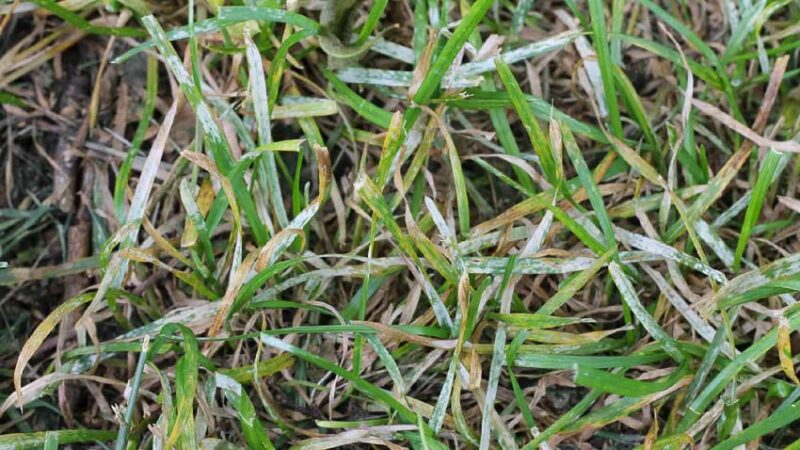
Watering your grass later than 8 pm can lead to your lawn staying moist throughout the night, which makes it more likely to sprout fungus and get diseases.
Best Time to Water Grass in the Summer
During the summer, the best time to water your grass is before the morning dew dries. While 6 am to 10 am is the optimal watering time through the growing season, during the summer you can safely water as early as you want.
Watering early gives the water a chance to soak into your lawn’s roots, which leads to cooler turf throughout the day.
During the spring, you should water your grass deeply to encourage strong root growth. This leads to a more resilient lawn in the summer, letting it stand up to the brutal summer heat.
Best Time to Water Grass in Hot Weather
Changes in the weather and the seasons can affect the amount of water your lawn needs. If the hot summer sun is turning your grass brown, it can feel like you need to water your lawn constantly to keep it green.
It’s important to remember that overwatering your lawn can also cause problems, and it’s also not optimal to water during the hottest part of the day.
Hot weather causes everything to heat up, and this includes your lawn. Plants will commonly wilt during the summer because they can’t transpire enough water to keep up with evaporation.
Deep watering will soak into your lawn, cooling the roots. However, your grass still may experience some wilting during periods of extreme heat.
You may need to increase your watering frequency during the summer, but you should still follow best practices by watering your lawn deeply in the early morning or evening.
Can You Water in the Sun?
You can water grass when the sun is out, but you should try to avoid watering once the sun is high in the sky. If your lawn shows signs of severe stress in the summer heat, you can give it some extra water in the middle of the day.
Although watering your grass in the sun isn’t as ideal of a time as the morning, it’s better than letting your grass get scorched by the heat. You may have heard of the myth that water droplets act like magnifying glasses on blades of grass, but scientists have dispelled this. Just like people get sunburns, sun exposure can scorch grass.
Dry lawns are more susceptible to damage caused by the sun. If your lawn gets too burnt, it can take weeks for it to bounce back to its normal self.
Should You Water After Mowing?
You can water your grass right after you mow. Since watering your grass in the early morning is the best time, try to mow as soon as the morning dew has dried. If necessary, you can water your grass after you finish mowing.
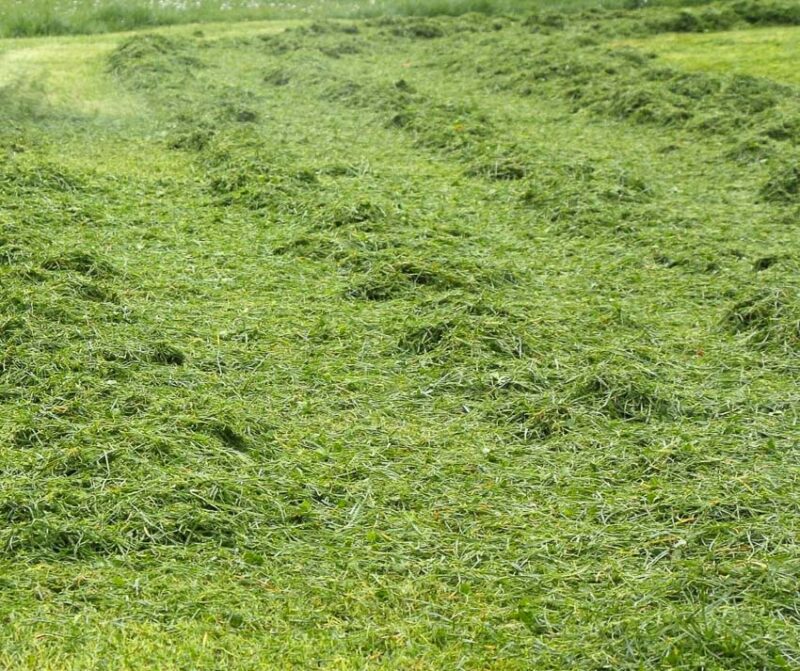
Watering before you mow can cause wet grass clippings to clump together, which is very annoying to deal with. Keep the two activities separated by scheduling them on different days of your lawn care cycle.
The best schedule is to water deeply two to three times per week in the early morning, and mow every 5 to 8 days.
How Long to Water Grass?
Different soil types absorb water at different rates, so there’s no one answer for how long you should water your grass. Knowing the right amount of time to water your lawn depends on how long it takes to notice runoff. You should stop watering your lawn when water starts running into the gutter or other dips in your landscaping.
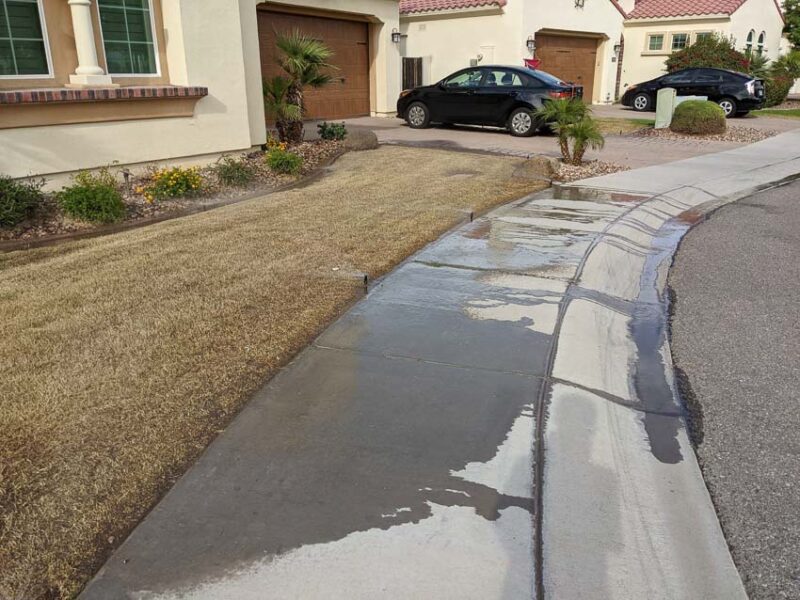
But how long do you water your grass before runoff occurs? To determine this, carefully observe and time your watering cycle, stopping when you notice runoff. This method tells you the maximum amount of time you should be watering your grass at a time.
Using this information, you can calculate how often you should water each week. For instance, if you determine your lawn needs 45 minutes of water per week, but runoff starts to happen after 15 minutes, you should water three times per week.
How Often to Water Grass?
How often you should water your grass depends on a variety of factors. The season, amount of rainfall, your growing zone, and the grass species all affect how much water your lawn requires.
Different grass types need different amounts of water throughout the year. Consider your grass species, local weather, and seasonal changes when you plan your watering schedule.
How Often to Water Bermuda Grass?
Bermuda grass is a warm-season grass. Warm-season grasses have deep root systems that extend far into the ground. You should be fine watering these grass types once or twice per week.
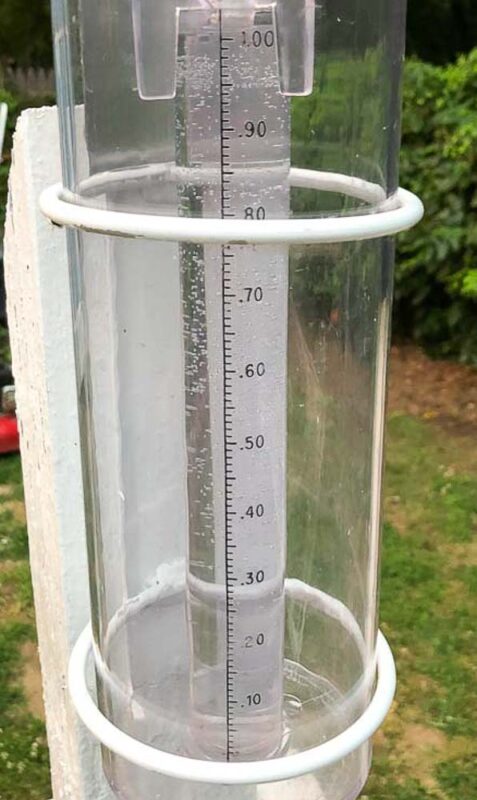
A rain gauge can help you ensure your warm-season grass gets a minimum of 1 to 1.5 inches of water per week, between rainfall and a sprinkler.
Peak growing conditions for warm-season grasses occur during the spring when the weather is warm and frequent rain provides daily moisture.
Warm-season grasses grow best when temperatures reach 80°F or above. They tolerate hot weather better than cool-season grasses thanks to their deep root systems.
When temps cool down in the fall, warm-season grasses still require moisture, but not as much as in the summer. You can taper your watering down to about one inch per week during the fall, including rain.
How Often to Water St Augustine Grass?
St. Augustine grass is another type of warm-season grass that grows best in tropical climates. Similar to Bermuda grass, St. Augustine grass requires water 2 to 3 times per week.
This grass type is excellent for humid regions and is resistant to salts in the soil, so you will typically find it in areas with sub-tropical weather, such as Florida and Texas.
St. Augustine grass stands out because of its thick carpet of dense, coarse, dark green blades.
How Often to Water Kentucky Bluegrass?
Kentucky bluegrass is one of the most popular cool-season grasses. The root systems of cool-season grasses don’t penetrate as deeply as their warm-season counterparts, leaving them vulnerable in hot weather.
Since cool-season grasses are mostly grown in northern regions, they rarely have to contend with more than a few weeks of extreme heat during the summer.
As a rule of thumb, cool-season grasses require more frequent watering than warm-season grasses. You should aim for around one inch of water per week, divided into three evenly-spaced watering sessions throughout the week.
During the fall, cool-season grasses can be weaned off of this high-volume watering schedule. You should still keep your eye on the soil and grass to make sure it’s well-hydrated, but also be sure not to overwater.
Take the amount of rainfall into account when determining how much to water your cool-season grass in the fall.
How Much to Water Grass?
Like most other figures relating to your grass, the amount of water your lawn needs depends on the weather, season, soil, and grass type. Changes in weather throughout the growing season will affect the amount of water your grass needs. During peak growth seasons, your lawn needs more water as it grows and re-establishes its roots.
How short you keep your grass also affects how much water your lawn needs since shorter grass doesn’t keep the soil as cool as longer grass. Mowing your grass to around 3 inches or more will make it more resistant to hot weather during the summer.
There are a couple of ways to tell if your grass has enough water.
One way to tell is to stick a screwdriver into the soil about six inches. If it goes in easy, with little resistance, your lawn has enough water.
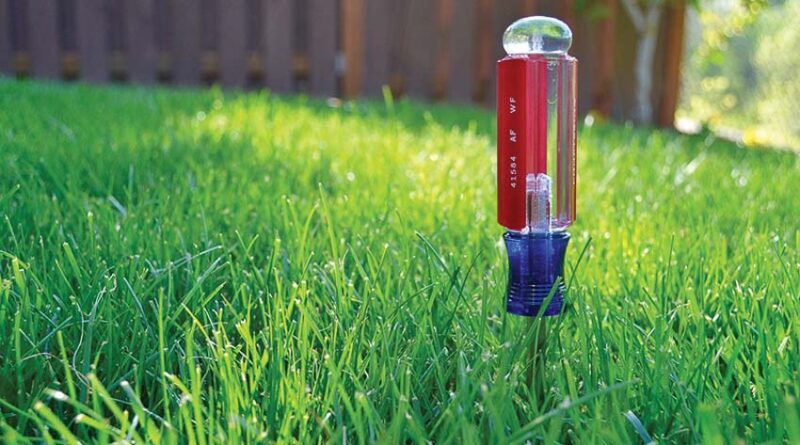
Also, pay attention to how quickly footprints disappear. A well-hydrated lawn will bounce back quickly after being walked on.
Finally, you can tell if your lawn needs water simply by looking at its color. If it’s a dull, greyish-blue color, it probably needs water.
Can You Overwater Grass?
The water requirements of your lawn change fairly often throughout the growing season, making overwatering your grass pretty easy. In addition to water and nutrients, grass needs oxygen to grow. Overwatering your lawn replaces oxygen in the soil, causing your roots to not be able to breathe.
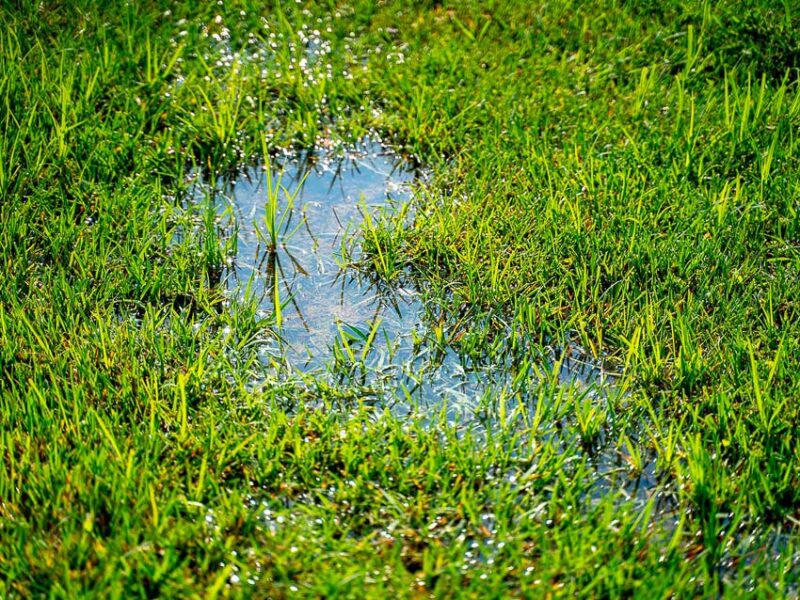
Here are a few signs that you’ve overwatered:
- Puddles–When the ground has stopped absorbing water, it starts pooling in low areas like gutters, sidewalks, and dips in your lawn.
- Fungus–Fungi thrive in moist conditions, and their presence is a primary indicator of overwatering.
- Wilting–Wilting grass is often associated with a thirsty lawn, but it can also mean your lawn has too much water.
- Spongy Soil–Your foot shouldn’t sink into mushy ground when you walk on your lawn.
- Root Rot–Discolored brown and yellow grass with slimy roots are symptoms of root rot, a common disease caused by overwatering.
How to Avoid Overwatering Your Lawn
Checking the soil before you irrigate can help you avoid overwatering your lawn. Probe into the soil about 6 to 12 inches to determine the levels of moisture.
Watering requirements change throughout the growing season, so it may be necessary to adjust your watering schedule. Keep in mind that the best time to water your lawn is in the early morning, and be sure to skip watering if rain is in the forecast for the day.
Best Time to Water New Grass Seed
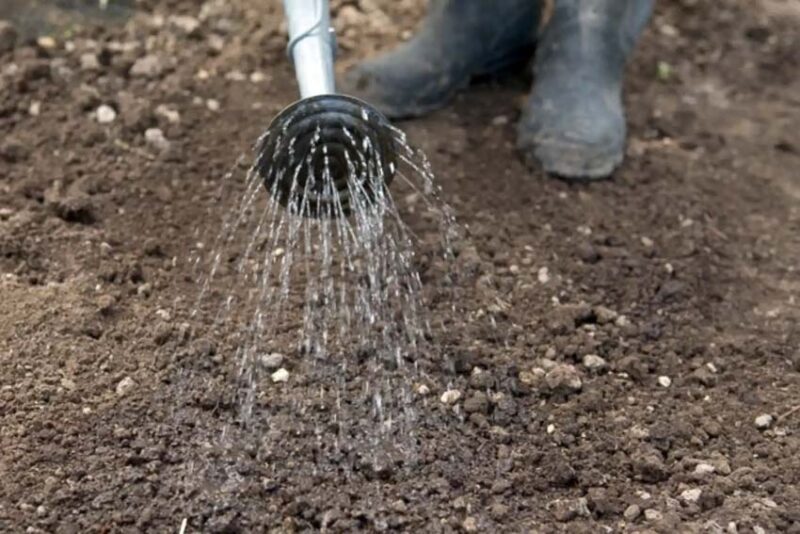
For watering new grass seed, the best time to do it is in the early morning or early evening. When you water during the day, the hotter temperatures will cause the moisture to evaporate before it can soak into the soil.
However, if you’ve planted new grass and you suddenly experience a heat wave, you may need to water during the middle of the day to keep your grass seedlings alive.
Keep in mind that the best time to plant grass seed is during the peak growing conditions for the species of grass you’re growing. Warm-season grasses are best planted in the spring thanks to the season’s frequent rains and warm temperatures. For cool-season grasses, you should plant during the fall to take advantage of cooler temperatures.
How Often to Water Grass Seed?
When you first plant grass, your lawn needs more frequent watering than established turf does. Knowing how often to water your new grass seed depends on the growing conditions of your soil and your region.
You should aim to keep the soil moist to promote germination so that seeds won’t die before developing roots. It’s also a good idea to water more than once a day because the top layer of soil is where the seeds are germinating. You can taper off your watering frequency once your grass becomes established.
Mulch can help prevent evaporation and protect new seedlings. You can also use wee-free straw mulch or an erosion mat to lock in moisture to newly planted lawns, increasing germination rates.
How Much to Water New Grass Seed in the Summer?
Compared to other seasons, summer is not the most ideal time to plant grass. However, if you are planting warm-season grass in the summer, you should make sure to keep the top layer of soil moist with frequent watering.
It’s also a good idea to keep an eye on the weather, avoiding planting if the forecast shows extreme heat or heavy rains.
Overwatering new seeds can lead to runoff, which can shift dirt, soil, and seeds, resulting in a patchy lawn. Too much water can also drown out the soil’s oxygen, which grass needs to grow.
How Long to Water New Grass Seed In The Fall?
It’s very common to plant grass in the fall for those in cool-season areas. The fall season allows grass seedlings to establish before the next hot summer rolls around.
Like all new lawns, the goal is to keep the top layer of soil moist, enabling the seeds to germinate and develop roots. For the first week or so, you might need to water them a few times per day, keeping in mind that if they dry out, they will die.
Water new grass seeds for a long enough time so that the water can soak into the soil. Light watering usually takes about 5 to 10 minutes.
Since very dry soil can sometimes repel water, it’s also a good idea to saturate the area a few days before you plan on planting. Bone-dry soil can lead to runoff and seed displacement.
Can You Overwater Grass Seed?
Gentle, frequent waterings are best for newly planted grass because it’s very easy to overwater grass seed.
Overwatering can shift the soil, causing the seeds to be either buried to exposed. Burying the seeds causes them to lose sunlight, which affects their ability to grow. Leaving them too exposed will dry them out and they may not germinate.
Lawn Watering FAQs
Is It Bad to Water Grass During the Day?
The morning is the best time to water grass, since it allows water to soak deep into the soil. Watering the grass during the peak heat of day can cause the water to evaporate before letting it soak in.
You may water your grass during the day if you notice that it’s turning brown due to lack of moisture. Even though it’s not the best time, it can take weeks to turn back green if it gets scorched.
Is It Bad to Water Grass at Night?
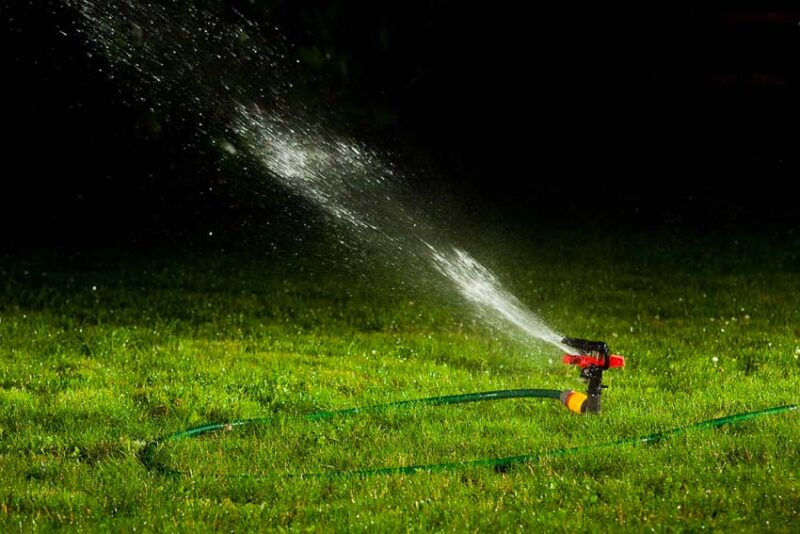
Watering your grass at night is not a good idea, since it can promote fungal growth and disease. If watering in the morning is off the table, you should try to aim for a timeslot before 8 pm so that your grass doesn’t stay wet all night.
How Long Can Grass Go Without Water?
For a green lawn, you should aim to water at least once per week, but grass can survive without water for several weeks. Without enough water, eventually, a lawn will go dormant.
Your lawn may turn brown and the blades might die even if the grass plant’s crown is still alive. Reviving a dormant lawn takes about two weeks of consistent watering a few times per day.
What Temperature is Too Hot to Water Grass?
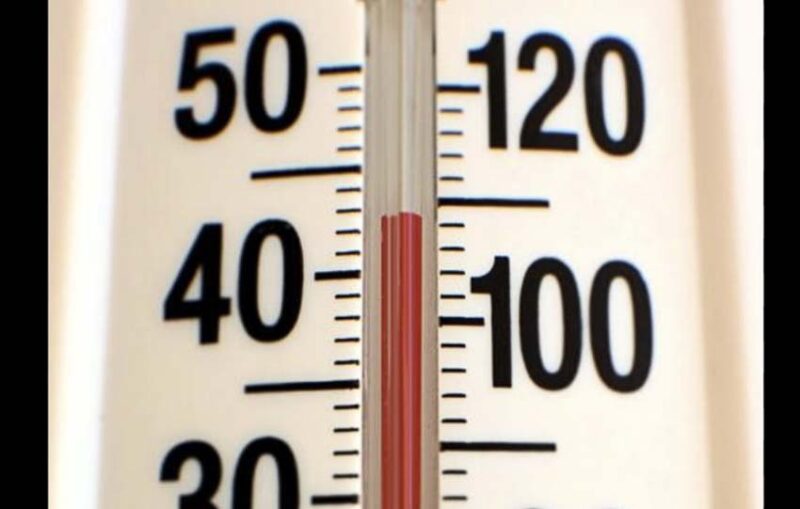
Once it reaches around 95°F, it’s too hot to water grass. During extremely hot periods, you should aim to water before 7 am for best results.
Watering this early gives the soil a chance to absorb moisture, keeping the grass cooler when temperatures are hot.
Does Pool Water Kill Grass?
If a few splashes of pool water get on your grass, it’s usually not a cause for concern. However, an in-ground pool or above-ground pool on your lawn isn’t a good idea.
Pool water contains chlorine, which can kill your grass. Before emptying your pool onto your lawn, it’s best to dilute the pool water.
Grass is less vulnerable to high chlorine levels than trees, shrubs, and flowers, so make sure to keep pool water away from these plants in your landscape.
Will Salt Water Kill Grass?
Salt can find its way onto your lawn in a number of ways, whether it be from ice-melting products, ocean spray, or pool water. In large enough quantities, salt water can dehydrate your grass, which could kill it.
Salt can also displace other essential minerals like potassium, which grass needs to grow.
Sometimes people use salt as a weedkiller, but since it doesn’t discriminate, it can also damage your lawn.






